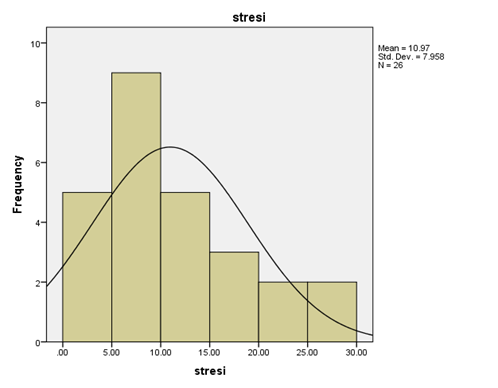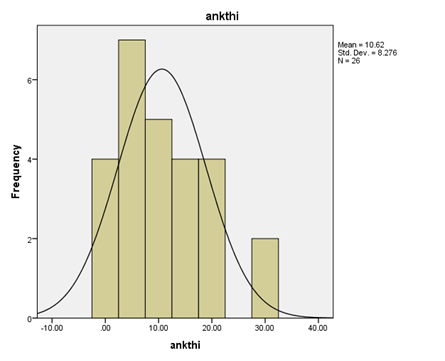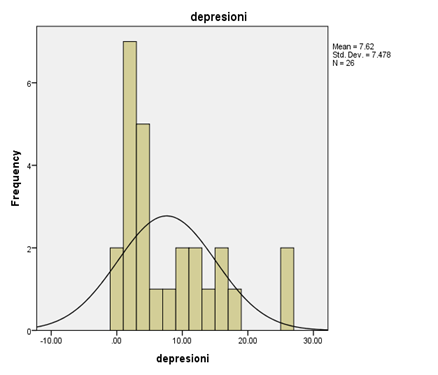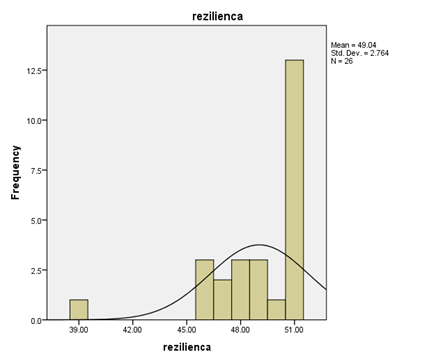Archive : Article / Volume 2, Issue 1
Case Report | DOI: https://doi.org/10.58489/2836-3604/005
Level of Stress, Anxiety, Depression, and Resilience for Social Workers During Covid 19 Pandemic in Kosovo
1.Clinical psychologist, Mental Health Center Pristhina
2.Neuropsychiatrist, MSc. Arjeta Ahmedi Seferi â Clinical psychologist, SOS Children's Villages Kosovo
Correspondng Author: Behare Bojaxhiu Huçaj
Citation: Behare Bojaxhiu Huçaj, Sami Rexhepi, Arjeta Ahmeti Seferi (2023). Level of Stress, Anxiety, Depression, and Resilience for Social Workers During Covid 19 Pandemic in Kosovo. Journal of Covid Research and Treatment 2(1). DOI: 10.58489/2836-3604/005
Copyright: © 2023 Behare Bojaxhiu Huçaj, this is an open access article distributed under the Creative Commons Attribution License, which permits unrestricted use, distribution, and reproduction in any medium, provided the original work is properly cited.
Received Date: 2023-01-11, Received Date: 2023-01-11, Published Date: 2023-01-26
Abstract Keywords: Stress, anxiety, depression, resilience, Covid19
Abstract
In January 2020, the WHO declared the outbreak of Coronavirus as a Public Health Emergency of international importance, the same happened in Kosovo. Public health actions, such as social distancing, isolation can make people feel lonely and can increase stress and anxiety.
This research aims to show the relationship between stress, anxiety, depression, and the development of resilience of social workers in the period of pandemics.
DASS will be used to measure S.A.D (Lovibond, SH & Lovibond, 1995) and the ARM to measure resilience (Ungar, 2008,2011).
It is hypothesized that S. Workers who have developed resilience will easily cope with S.A.D, while workers who failed to develop resilience will be more vulnerable to S.A.D. Participants are 39 social workers of CSW Pristina.
The findings of the study show that the level of SAD is toa moderate extent and the level of resilience is high.
Introduction
In recent months the world is facing a previously unknown virus, which is hitting all spheres without sparing even mental health. Mental health and physical health have a harmonized balance and with the imbalance of one and the other, I will live this imbalance.
Considering these phenomena as social problems, research questions have been raised, which aim to understand the level of involvement and the relationship between stress, anxiety, and depression in social workers, as well as the ability to recover and build resilience after this research. coping with a dangerous situation (Covid 19).
Covid-19 globally and in Kosovo
In January 2020, the World Health Organization (WHO) declared the outbreak of Coronavirus disease as a Public Health Emergency of international importance. The WHO stated that there is a high risk of spreading the new Coronavirus (COVID-19) disease to other parts of the world and therefore declared a pandemic. WHO and public health authorities around the world, including Kosovo, have taken action to control the COVID-19 outbreak.
Symptoms of Coronavirus infection include fever, chills, cough, sore throat, nausea and vomiting, and diarrhea. Individuals with a history of other diseases are more likely to become infected with the virus and may experience worse outcomes (Chen N. et al.2020). Severe cases of the disease can lead to respiratory failure, heart failure, acute respiratory syndrome, or even death (Holshue ML, et al.2020).
After almost 3 months in quarantine, and the rest with concrete bans the state continues to face difficulties in managing the virus. Numerous institutions have been active necessities in their work during the pandemic period and especially during the quarantine period. After the necessary medical service, for the population, the field of social care remains the key profession that connects the wide range of services and the first reaction in a situation like the pandemic where the population feels insecure and are physically and mentally vulnerable.
The psychological condition of the population during Covid 19
In addition to physical impacts, COVID-19 can have serious effects on people's mental health (Huang Y.et et al. 2020). A wide range of psychological outcomes has been observed during the outbreak of the virus, at individual, community, national and international levels.
The pandemic has had a detrimental effect on public mental health, which can even lead to psychological crises (Xiang Y-T.et al.2020).
Health crises, such as the COVID-19 pandemic, lead to psychological changes, not only in health care workers, but in other individuals who contribute to other areas, and such psychological changes are driven by fear, anxiety, depression, or insecurity (Zhang J. et al. 2020).
Recent evidence suggests that people who are kept isolated and quarantined experience significant levels of anxiety, anger, confusion, and stress (Brooks SK. Et al. 2020).
Overall, all studies that have examined psychological disorders during the COVID-19 pandemic have reported that affected individuals exhibit some symptoms of mental trauma, such as emotional distress, depression, stress, mood swings, nervousness, insomnia, attention deficit hyperactivity disorder, post-traumatic stress, and anger (Wang Y et al. 2011, Rubin GJ & Wessely S. 2020).
Social care and mental health
Social care / social work is already a stressful profession and no doubt according to data from many countries this category of professionals was facing a health care crisis even before Covid-19 (Community Care, 2020b).Three groups are at particular risk of psychological symptoms (Inchausti, 2020):health and social care workers responding to the pandemic and their patients/clients’; individuals diagnosed with Covid-19, losing family and loved ones to the disease, and affected by prolonged social distancing; individuals with existing mental health conditions exacerbated by current circumstances.
Theoretical perspective Stress, anxiety, depression, and resilience
Stress is associated with short-term health problems, as well as long-term ones. It is therefore important to trace the health risks of social work, a profession that coexists with stress, depression, and burnout (Community Care, 2016)
The relationship between psychosocial stressors and illness is influenced by the nature, number, and persistence of stressors, by the individual's biological vulnerability, psychosocial resources, and learned coping patterns (Schneiderman, Neil & Iron son, Gail & Siegel, Scott, 2005).
Anxiety is often a general emotional reaction to stress; it is a fear caused by the demands placed on the person when he does not know what these demands are actually.
Depression is a mental health disorder. It is more than just a temporarily bad feeling for some special reason; is a medical disorder that needs professional help and can be treated. Signs of depression should not be confused with normal worries or suffering, depression is a disease that includes signs and symptoms that last for weeks, months, or years, without knowing the condition or without proper treatment.
Resilience is about each individual's ability to overcome a challenge, difficult situation, and recover emotionally (Stein, 2005). Resilience is described as the interaction between risk and protective factors, a process that results from the individual response to risk factors that are present in that environment (Luthar, 2006; Luthar& Cicchetti, 2000).
Resilience develops when these factors trigger certain processes within the individual, such as: building a positive self-image, reducing the impact of risk factors as well as breaking a negative cycle and giving space for new opportunities for the individual.
In the context of exposure to a significant disaster, resilience is the ability of individuals to find their way to the psychological, social, cultural, and physical resources that support their well-being, as well as their ability individually and collectively to negotiate these resources. to be provided in culturally meaningful ways” (Ungar, 2008, 2011).
Research methodology
Stress, anxiety, and depression are psychic phenomena that can appear in everyone, but if the degree of their manifestation is increasing and affects the daily functioning of the individual it becomes a disturbing phenomenon and in need of further study. Considering these phenomena as social problems, research questions have been raised, which aim to understand through this research the level of involvement of stress, anxiety, and depression in social workers, as well as the ability to recover after coping with a dangerous situation such as is Covid-19.
The research is quantitative and the questionnaire was used to answer the research questions in this research:
DASS (Lovibond, S.H. & Lovibond, 1995) to measure the level of stress, anxiety, and depression and the questionnaire:
ARM to measure the level of resilience (Ungar, 2008,2011).
Target group / Social workers of CSW Pristina-Kosovo (38 total).
Hypotheses
It is hypothesized that workers who have developed resilience will more easily cope with stressful situations, anxiety, and depression, while workers who for certain reasons and factors have failed to develop resilience in this situation will be more vulnerable to stress, anxiety, and depression.
Workers who have provided field services will be more likely to develop anxiety and depression compared to workers who have provided office services.
In this research, the focus has been on finding the arithmetic mean for the degree of manifestation of stress anxiety and depression during the pandemic period in social workers.
On the other hand, the degree of resilience was required, which shows the ability to recover from a life-threatening stressor, in our case Covid-19.
Stress is also considered a source of many mental health concerns and is also considered a key factor in the manifestation of depression and anxiety, while it has been pronounced in social workers during the pandemic according to statistical analysis of findings, we have these data arithmetic mean M = 10.97, standard deviation б = 7.95 and measurement error б = 1.56
Regarding the degree of manifestation of anxiety in social workers during the pandemic period, the data have resulted in a moderate mean scale, where the arithmetic mean is M = 10.62, standard deviation б = 8.27, and measurement error бD = 1.62.
Regarding the degree of manifestation of depression in social workers, the arithmetic means resulted in M = 7.61, which means a low degree of manifestation of depression with standard deviation б = 7.47 and measurement error бD = 054.
Resilience which is considered the ability to cope with recovery after a difficulty has been at a fairly high level in social workers and this has been proven by the findings of statistical analysis, where the average degree of resilience has resulted in a height of M = 49.03, with a deviation standard of б = 2.76 and standard error б = 0.54




Numerical variables used: arithmetic mean, standard deviation, measurement error, distribution sizes. For categorical variables, absolute values and respective percentages were calculated. Comparison of mean values between the two groups was enabled through the T-test, the correlation of categorical variables was performed using Pearson Chi-Square. Average values and corresponding 95% confidence intervals were calculated for all indicators. In all cases, a value of p ≤ 0.05 was considered statistically significant. All statistical analysis was performed in SPSS v.22.
Recommendation
- Repeat the research after 6 months or eventually after the end of the pandemic and compare the findings from different stages of testing in the same social workers.
- Supervision and team support protect them from occupational burnout and are protective factors in maintaining mental health.
- Strengthening support systems and identifying protective factors (internal factors of resilience - being proactive, feeling of self-control and deciding what to do and external ones - children, families, society - cultivating careful relationships, positive expectations and opportunities for meaningful participation in solving a difficulty)
- By empowering and developing these factors, the effects of risk will be reduced and adaptability will be increased.
What the experts recommend
Recommended interventions to reduce occupational burnout, fatigue, loss of compassion, real or perceived stress, and ineffective therapeutic techniques (Dewey et al., 2020; Hansel, 2020; Joshi and Sharma, 2020; Perez et al., 2020; Sasangohar et al., 2020) include:
- Give priority to individual self-care practices;
- Breathing exercises, mindfulness, and use of telehealth services (therapy);
- Use of social media applications and virtual platforms (e.g., Twitter and Zoom) to create social activities that promote health and well-being: book clubs, support groups, meditation, yoga, etc., which will encourage the creation of social support networks;
- Participation in social marketing campaigns related to social distancing, self-care, etc.
- Community volunteering (food distribution, assistance to people in need, community contribution and observations of needed services;
- Engage in the social work community to stay connected with other professionals and raise awareness of additional opportunities and individual contribution;
- Review of local, national, and global policies for emergency preparedness;
Limitation of the study
Not all social workers in the Republic of Kosovo are included (CSW-Pristina only) and data cannot be generalized at the national level.
In stressful and life-threatening periods, the individual focus may be on survival / relatively on finding and developing resilient factors and ignoring potential risk factors that tend to appear after the end of the dangerous situation (Covid 19)
Long experience in social work of social workers and dealing with other stressful situations may have influenced social workers to have developed high levels of resilience, and low or moderate levels of stress, anxiety, and depression.
References
- Bai Y, Yao L, Wei T, Tian F, Jin D-Y, Chen L, et al. (2020), Presumed asymptomatic carrier transmission of COVID-19. JAMA.323(14):1406–7.
- Feldmann H, Jones S, Klenk H-D, Schnittler H-J. (2003), Ebola virus: from discovery to vaccine. Nat Rev Immunol. 3(8):677–85
- Team N-O, Daëood F, Jain S, Finelli L, Shaë M, Lindstrom S, et al. (2009), Emergence of a novel sëine-origin influenza a (H1N1) virus in humans. N Engl J Med. 360(25):2605–15.
- Ashour HM, Elkhatib ËF, Rahman M, Elshabraëy HA. (2020), Insights into the recent 2019 novel coronavirus (SARS-CoV-2) in light of past human coronavirus outbreaks. Pathogens. 9(3):186.
- Chen N, Zhou M, Dong X, Qu J, Gong F, Han Y, et al. (2020), Epidemiological and clinical characteristics of 99 cases of 2019 novel coronavirus pneumonia in Ëuhan, China: a descriptive study. Lancet. 395(10223):507–13.
- Holshue ML, DeBolt C, Lindquist S, Lofy KH, Ëiesman J, Bruce H, et al. (2020), First case of 2019 novel coronavirus in the United States. N Engl J Med. 382:929–36.
- Huang Y, Zhao N. (2020), Generalized anxiety disorder, depressive symptoms and sleep quality during COVID-19 epidemic in China: a ëeb-based cross-sectional survey. MedRxiv. 288:112954.
- Hall RC, Hall RC, Chapman MJ. (2008), The 1995 Kikëit Ebola outbreak: lessons hospitals and physicians can apply to future viral epidemics. Gen Hosp Psychiatry. 30(5):446–52.
- Xiang Y-T, Yang Y, Li Ë, Zhang L, Zhang Q, Cheung T, et al. (2020), Timely mental health care for the 2019 novel coronavirus outbreak is urgently needed. Lancet Psychiatry. 7(3):228–9.
- Zhang J, Lu H, Zeng H, Zhang S, Du Q, Jiang T, et al. (2020), The differential psychological distress of populations affected by the COVID-19 pandemic. Brain Behav Immun. 87:49–50.
- Brooks SK, Ëebster RK, Smith LE, Ëoodland L, Ëessely S, Greenberg N, et al. (2020), The psychological impact of quarantine and hoë to reduce it: rapid revieë of the evidence. Lancet. 14;395(10227):912–20.
- Ëang Y, Xu B, Zhao G, Cao R, He X, Fu S. (2011), Is quarantine related to immediate negative psychological consequences during the 2009 H1N1 epidemic? Gen Hosp Psychiatry. 33(1):75–7.
- Rubin GJ, Wessely S. (2020), The psychological effects of quarantining a city. BMJ. 368:m313.
- Neria Y, Sullivan GM. (2011), Understanding the mental health effects of indirect exposure to mass trauma through the media. JAMA. 306(12):1374–5.
- Shigemura J, Ursano RJ, Morganstein JC, Kurosaëa M, Benedek DM. (2020), Public responses to the novel 2019 coronavirus (2019-nCoV) in Japan: mental health consequences and target populations. Psychiatry Clin Neurosci. 74(4):281.
- Schneiderman, Neil & Ironson, Gail & Siegel, Scott. (2005). Stress and Health: Psychological, Behavioral, and Biological Determinants. Annual review of clinical psychology. 1. 607-28.
- Coping With Anxiety and Depression During the Coronavirus Pandemic. (2020). US Neës &Ëorld report. Retrieved from https://health.usneës.com/Wellness/for-parents/articles/coping-ëith-anxiety-and-depression-during-the-coronavirus-pandemic [Google Scholar]
- Cullen, Ë (2020) Mental health in the Covid-19 pandemic QJM: An International Journal of Medicine (open access)
- Rajkumar, RP (2020) COVID-19 and mental health: A review of the existing literature Asian Journal of Psychiatry Volume 52, August 2020 (open access) 20.
- Shah, K (2020) Focus on Mental Health During the Coronavirus (COVID-19) Pandemic: Applying Learnings from the Past Outbreaks Cureus, 12(3), e7405 (open access) 21.
- Neës Medical (2020) Neë app to be developed to protect carers, support ëorkers during COVID-19 pandemic (ëebsite) 22.
- NHS Scotland (2020) Staying Safe &Well: A Self Care Guide for Staff looking after patients ëith Coronavirus (pdf)
- Lovibond, S.H. & Lovibond, P.f. (1995). Manual for the Depression anxiety. Stress Scales. (2nd Ed) Sydney: Psychology Foundation.


